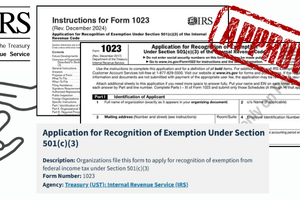How long does it take to form a charity or private foundation?
Forming a nonprofit organization is a multi-step process, and the total timeline depends on how your organization is structured and how quickly the IRS processes your application for tax-exempt status.
Step 1: Form the nonprofit entity (1-2 weeks)
First, you’ll need to incorporate your nonprofit under Arizona law by filing Articles of Incorporation with the Arizona Corporation Commission, drafting bylaws, appointing a board of directors, and obtaining an EIN from the IRS. This initial formation work typically takes one to two weeks.
Step 2: Apply for 501(c)(3) tax-exempt status (1-6+ months)
Once your nonprofit is formed, you’ll apply to the IRS for recognition as a tax-exempt organization under Section 501(c)(3). The timeline depends on which form you file:
- Form 1023-EZ (for smaller organizations with projected annual gross receipts under $50,000): The IRS typically processes these applications in 2-4 weeks.
- Form 1023 (the full application for larger or more complex organizations): Processing currently takes approximately 3-6 months, though it can take longer if the IRS requests additional information or if your application is incomplete. According to current IRS data, 80% of Form 1023 applications are processed within about 6 months.
Step 3: State registrations (varies)
Depending on your activities, you may also need to register with the Arizona Attorney General’s Office for charitable solicitation and apply for state tax exemptions, which adds additional time.
Total timeline: 2-8 months on average
For a straightforward organization using Form 1023-EZ, you could be fully operational with tax-exempt status in as little as a month. For more complex organizations filing Form 1023, plan for 4-8 months from start to finish—and potentially longer if issues arise during the IRS review.
Why working with an attorney helps: The most common reason for delays is an incomplete or improperly prepared application. An attorney can ensure your Articles of Incorporation contain the required IRS language, your application is complete and accurate, and you’ve selected the right form for your organization—helping you avoid costly back-and-forth with the IRS that can add months to the process.
